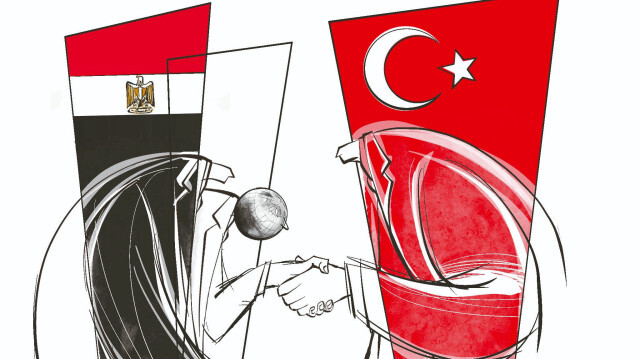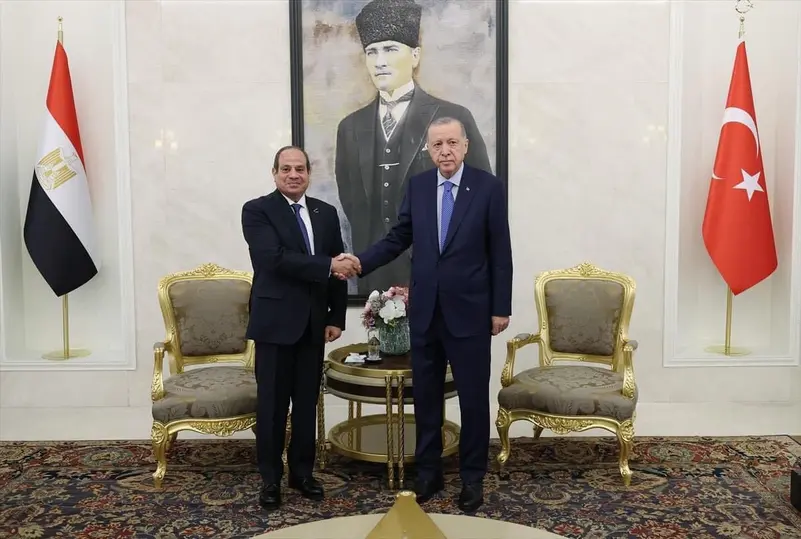Natural Gas and Nuclear Energy: The Key to Reviving Turkish-Egyptian Relations

Sisi's visit to Turkiye marked the beginning of a new chapter between the two countries.
Turkiye's foreign policy in the new multipolar, multilayered global order is drawing attention worldwide.
The Turkish newspaper Yeni Safak published an article by writer Faruk Onalan, noting that “Abdel Fattah al-Sisi's [the head of the Egyptian regime] visit to Turkiye on September 4, 2024, marked the beginning of a new chapter between the two countries, sparking widespread reactions on both regional and international levels.”
The Turkish writer also pointed out that “with the centennial of diplomatic relations approaching in 2025, the High Strategic Cooperation Council between Ankara and Cairo has outlined the areas of planned cooperation through a joint statement consisting of 36 articles.”

‘Israel’ and Greece
“The most critical issue in Turkish-Egyptian relations is energy resources in the Eastern Mediterranean,” Onalan stated.
Cairo did not include Turkiye in the East Mediterranean Gas Forum (which includes Egypt, “Israel,” the Greek Cypriot Administration, Palestine, Greece, Lebanon, and Italy), a forum it spearheaded in founding.
However, Ankara rendered the forum ineffective by signing a maritime jurisdiction agreement with the Libyan government.
Onalan pointed out that “the Cairo administration understands that an agreement with Ankara for the transfer of gas in the Eastern Mediterranean would be more profitable, but it is trying to maintain its cooperation with Athens and the Greek Cypriot Administration to preserve its relations with the West.”
The first reactions came from “Israel” and Greece, with the Israeli side expressing concern that the move would not be in their favor, as it would create a significant power balance in the region in Turkiye's favor.
Greece’s primary concern, however, is the possibility of Egypt lifting its reservations on the maritime jurisdiction agreement between Turkiye and Libya.
Such a possibility worries Athens greatly, as it could lead to a new agreement between Turkiye and Egypt.
“There is a belief in the Greek press that the possibility of an exclusive economic agreement between Turkiye and Egypt, which could exclude Greece as happened with the Turkiye-Libya agreement, would be catastrophic for Greece,” said Onalan.
Greek media assert that some clauses in the agreement signed between Turkiye and Egypt “should be of serious concern to Greece.”
Professor Ioannis Mazis, former president of the Faculty of Turkish Studies and Modern Asian Studies at the National and Kapodistrian University of Athens, noted that the “Erdogan-Sisi meeting should raise alarms in Athens,” comparing Athens’ administration to a “lame horse.”
Greek journalist Paris Karvounopoulos criticized the Athens government, saying, “Turkiye is playing on the field, and we’re not even on the sidelines.”
Unalan added, “It’s no secret that there is also concern within the Greek Cypriot Administration, with the first indication being a call from Greek Cypriot Foreign Minister Konstantinos Kombos to his Egyptian counterpart immediately after Sisi’s visit.”
While the Greek Cypriot Administration remains optimistic that Egypt’s position on the exclusive economic zone agreements will not change, the anxiety is evident.
Egyptian, Greek, and Greek Cypriot foreign ministers are scheduled to meet for a trilateral summit in New York on September 24, 2024, on the sidelines of the United Nations General Assembly.
Technological Agreement
“As Turkiye steadily advances toward becoming a central energy hub thanks to its strategic location, it also aims to expand its military and diplomatic influence in the region,” Onalan said.
In this context, President Erdogan’s statement that “Turkiye seeks to enhance cooperation with Egypt in natural gas and nuclear energy” can be seen as pivotal for the upcoming period.
Turkiye has signed liquefied natural gas (LNG) supply agreements with several countries and international companies and is in talks to import LNG from Egypt as well.
With the signing of a memorandum of understanding in the energy sector with Cairo, the two countries plan to develop joint projects in electric infrastructure, trade, renewable energy, energy efficiency, hydrogen, and nuclear energy.
The Turkish writer noted that “there are clearly significant developments in defense industries between Egypt and Turkiye.”
A few months ago, Foreign Minister Hakan Fidan confirmed that an agreement had been reached with Egypt to supply drones and other technologies.
Shortly after this statement, Chief of General Staff Osama Askar made an official visit to Turkiye.
During his visit, Askar toured the National Technology Center “Ozdemir Bayraktar” and the Turkish Aerospace Industries facilities.
“Israeli crimes in Gaza were one of the main reasons that accelerated the rapprochement between Cairo and Ankara,” according to Onalan.
The Ankara agreement was signed to intensify efforts for a permanent ceasefire and to establish a fully sovereign and independent Palestinian state on the 1967 borders, with East Jerusalem as its capital.
The agreement also underscored the critical need for Palestinian unity and pledged support for all initiatives aimed at achieving it.
“After a permanent ceasefire, Ankara, Cairo, and Doha may lead efforts for the reconstruction of Gaza,” said the Turkish writer.

Significant Decisions
Onalan noted that “diplomatic communications between Egypt and Turkiye began at a low level in 2021, but they quickly accelerated due to regional developments.”
He explained that “the energy resources in the Eastern Mediterranean, the political situation in Libya, relations with Gulf states, the dam crisis with Ethiopia, the fragile situation in Sudan, and finally, Israeli crimes in Gaza were among the main reasons that pushed Turkiye and Egypt back to the negotiation table.”
Onalan highlighted that “ultimately, both countries sought to adapt to the shifting balance of power in the region and strengthen economic cooperation by elevating diplomatic rapprochement to the highest level.”
“Egypt and Ethiopia’s formal accession to the BRICS group starting from January 1, 2024, alongside Turkiye’s expressed interest, is highly significant. It is also likely that major decisions will be made at the BRICS summit scheduled for October 2024.”
In the joint statement of the High Council for Strategic Cooperation between Turkiye and Egypt, “the importance of achieving peace, security, and stability in the Horn of Africa was emphasized, along with the promotion of good neighborly relations, friendship, and mutual respect for territorial integrity and sovereignty.”
Ethiopian Prime Minister Abiy Ahmed had written a letter to President Erdogan requesting Turkiye’s support in the dispute between Ethiopia and Somalia.
In this context, Foreign Minister Hakan Fidan held talks with his Ethiopian and Somali counterparts, hosting them in Ankara in an effort to reach a consensus.
Onalan noted that Ankara could potentially act as a mediator between Cairo and Addis Ababa in the crisis that arose after Ethiopia’s construction of the Grand Renaissance Dam on the Nile River.
He emphasized that “the intense military movements toward the Somali border have the potential to spark a new crisis at any moment.”










